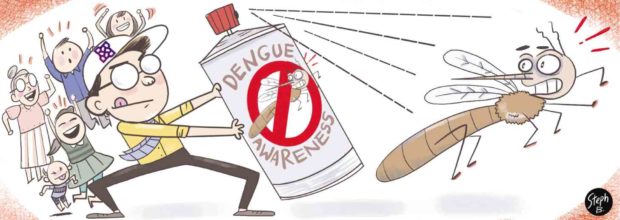Dengue cases throughout the country have reached alarming levels, with some regions even breaching their average number of cases over the last five years.
Thus, local government units and private health institutions are working twice as hard to remind people to take precautionary measures to combat dengue.
Trusted health maintenance organization Medicard Philippines Inc. recently came out with a “Dengue Awareness” bulletin which shares a few fast facts about this mosquito-borne viral infection.
According to Medicard, while there is no specific treatment or cure for dengue, intervention such as preventing dehydration and taking painkillers such as tylenol or paracetamol can help, especially in milder forms of dengue. The patient suffering from dengue should be given clean water, preferably bottled water instead of tap water. Rehydration salts can also help in replacing the body’s fluids and minerals.
In severe cases, however, the patient may need intravenous fluid supplementation if the patient cannot take fluids by the mouth. Blood transfusion may also be needed for patients with severe dehydration.
Medicard emphasized on the need to follow the Department of Health (DOH)’s “4S strategy” against dengue: 1) search and destroy, 2) self-protection measures, 3) seek early consultation, and 4) say yes to fogging, in cases of an impending outbreak.
As responsible homeowners, it should be our duty to keep water drums and pails covered to prevent mosquitoes from laying their eggs on these. Flower vases may be pretty but stagnant water in these may also be a breeding place for the Aedes aegypti, the virus-carrying mosquito, so make sure that you replace the water at least once a week. We should also see to it that all unused tin cans, jars, bottles and other items that can collect and hold water are properly disposed of.
“Self-protection measures” include wearing long pants and long-sleeved shirts and using mosquito repellant every day, both which can help serve as our armor versus those pesky and possibly even deadly mosquito bites.
In its “Dengue Awareness” bulletin, Medicard reminds the public that among the primary symptoms of dengue include high fever, severe headache and severe pain behind the eyes. Other symptoms associated with the flu-like illness are joint, muscle and bone pains, rashes, mild bleeding, low back pain and swollen lymph nodes of the neck and the groin.
Medicard advises everyone to consult a doctor immediately if fever persists after two days and rashes appear. The health maintenance organization has free-standing clinics all over the metro that are ready to serve its members—and even nonmembers—especially with today’s rising number of dengue cases.
